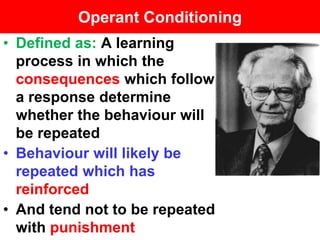
3 phase model of operant conditioning - VCE U4 Psych
- 1. Operant Conditioning • Defined as: A learning process in which the consequences which follow a response determine whether the behaviour will be repeated • Behaviour will likely be repeated which has reinforced • And tend not to be repeated with punishment
- 2. 3 phase model of operant conditioning A: Antecedent B: Behaviour C: Consequence Key Operant terminology • (1) The antecedent condition leads to a • (2) behaviour/ response which results in a • (3) consequence (Punishment or Reinforcement) • Thus affecting future behaviour
- 3. Example 1: 3 phase model Discriminative Operant Consequence Stimulus response Example The old lady across the road, asks 17 y.o Xander if he can mow the lawn for her. He agrees to do it and after he finishes the job, she thanks him & hands him an envelope with $15 in it. Now whenever she asks Xander to mow the lawn, he happily obliges Discriminative Operant response Consequence Effect on future Stimulus behavior Being Agreeing to Receiving thanks + asked to mow the lawn and $15 Reinforcement mow the more likely to lawn repeat lawn
- 4. Example 2: 3 phase model Discriminative Operant Stimulus Consequence response Example Zach finds some cans on paint under the house, on the weekend he goes to school with some paint and graffiti’s his tag on several school buildings, he gets busted and is appears before the children’s court. Zach never graffiti’s again Discriminative Operant response Consequence Effect on future Stimulus behavior Cans of Graffiti’s tag Busted by Police Punishment spray names at school less likely to paint graffiti again
